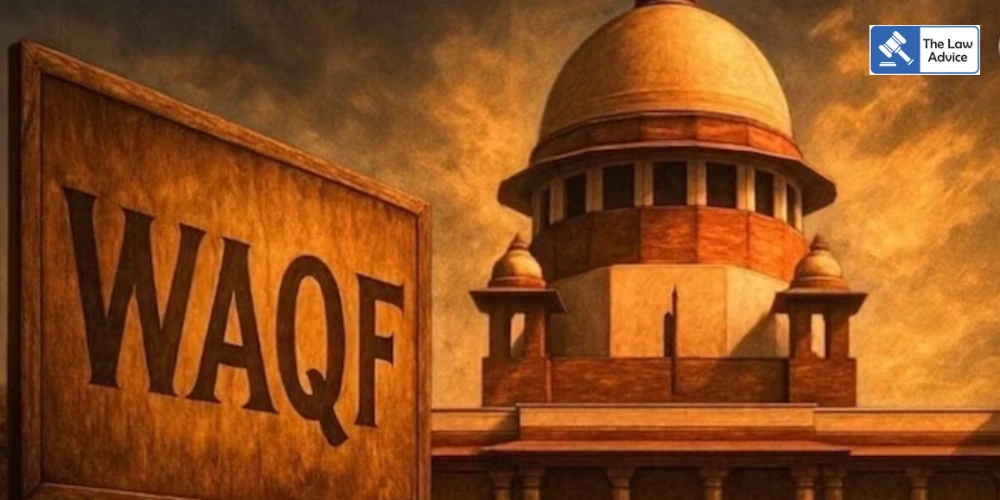The Supreme Court on Sunday passed an interim order on the constitutional challenge to the Waqf (Amendment) Act, 2025, staying certain controversial provisions while leaving others untouched at this stage.
A Bench of Chief Justice of India B.R. Gavai and Justice A.G. Masih clarified that while the entire statute had been assailed, only in exceptional cases can a legislation be stayed in its entirety. The Court therefore intervened selectively to prevent arbitrariness and safeguard property rights, while allowing the rest of the amendment to remain in force until final adjudication.
Provisions Stayed
1. Five-Year Islamic Practice Condition
The requirement under Section 3(1)(r) that a person must be a practitioner of Islam for at least five years before creating a Waqf has been stayed. The Court said that in the absence of State rules providing a mechanism for verification, the clause could lead to arbitrary action. However, it observed that the condition itself was not per se unconstitutional, as it aimed to prevent misuse of Waqf protection by recent converts acting in bad faith.
2. Government Power to Derecognise Waqf Land
The Court stayed Sections 3C(2), 3C(3), and 3C(4), which allowed a government officer to determine whether disputed property is Waqf land or government land, and to direct corrections in revenue records accordingly.
CJI Gavai held that permitting the Executive to adjudicate property rights violates the separation of powers, and clarified that until disputes are finally decided by a Waqf Tribunal under Section 83 or by a High Court, neither Waqf properties will be derecognised nor revenue records altered. At the same time, no third-party rights are to be created in such disputed lands during the pendency of proceedings.
3. Non-Muslim Membership in Waqf Councils and Boards
The Court directed that non-Muslim members in the Central Waqf Council must not exceed four out of twenty, and in State Waqf Boards must not exceed three out of eleven.
Provisions Not Interfered With
• Appointment of CEO: The Court declined to stay Section 23, which permits appointment of a non-Muslim as Chief Executive Officer of State Waqf Boards, but observed that “as far as possible” the CEO should be from the Muslim community.
• Registration Requirement: The Court upheld the condition of compulsory registration of Waqfs, noting that this existed in the Waqf Act from 1995 to 2013 and was not a new burden.
• Other Contentious Clauses: The Court left untouched provisions abolishing waqf by user, barring creation of waqfs in Scheduled Areas and ASI-protected monuments, restricting women’s representation in Councils and Boards, applying the Limitation Act, and diluting waqf-alal-aulad (family waqfs).
CJI Gavai, while pronouncing the order, underlined that:
• “Only in the rarest of rare cases can a legislation be stayed by the Court.”
• Since the petitions mainly target specific clauses, a blanket suspension of the Act was not justified.
• The directions issued are prima facie in nature and will not affect the final hearing on the constitutionality of the provisions.
The Waqf (Amendment) Act, 2025 introduced sweeping reforms in Waqf law, including changes to governance, registration, dispute resolution, and the scope of Waqf property. The amendments triggered multiple writ petitions filed by political leaders such as AIMIM MP Asaduddin Owaisi, TMC MP Mahua Moitra, RJD MP Manoj Jha, and SP MP Zia ur Rehman, as well as organisations like the All India Muslim Personal Law Board, Jamiat Ulema-i-Hind, Samastha Kerala Jamiatul Ulema, and civil society groups.
Five BJP-ruled States—Assam, Rajasthan, Chhattisgarh, Uttarakhand, Haryana, and Maharashtra—have filed intervention applications supporting the amendments. Recently, Kerala also joined in support of the legislation.
The common provisions under challenge include:
• Omission of waqf by user
• Inclusion of non-Muslim members in Waqf institutions
• Five-year Islamic practice pre-condition
• Government’s role in encroachment disputes
• Restrictions on creating waqfs in Scheduled Areas and protected monuments
• Limitation on women’s membership
• Dilution of waqf-alal-aulad
• Renaming of the 1995 law as the “Unified Waqf Management, Empowerment, Efficiency and Development Act”
